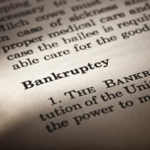 Against common belief, filing bankruptcy can be a very easy process; especially if you are filing a Chapter 7 Bankruptcy. Knowing what to expect when filing bankruptcy as well as hiring an experienced bankruptcy attorney are the keys to making it as easy of a process as possible. The goal of this article is to inform you of what to expect when filing bankruptcy.
Against common belief, filing bankruptcy can be a very easy process; especially if you are filing a Chapter 7 Bankruptcy. Knowing what to expect when filing bankruptcy as well as hiring an experienced bankruptcy attorney are the keys to making it as easy of a process as possible. The goal of this article is to inform you of what to expect when filing bankruptcy.
Regardless of whether you are planning to file a Chapter 7 Bankruptcy or a Chapter 13 Bankruptcy, the beginning of the process is very similar. If you choose to hire an attorney, which I strongly encourage you to do, the process begins with an initial consultation in which you and your attorney discuss your reasons for filing bankruptcy, your income and household size, as well as your assets. Depending on your goals, income and assets, you and your attorney will discuss the pros and cons of filing a Chapter 7 Bankruptcy verses a Chapter 13 Bankruptcy and together come up with a plan that is unique to your specific set of circumstances.
Once you have decided which type of bankruptcy you will be filing, the next step is to gather the documentation your attorney will need in order to prepare your bankruptcy petition. Your attorney will let you know what he or she will need, which differs depending on your specific set of circumstances. Once your attorney has all the documentation he or she will need for your petition, an appointment is set for you to meet with your attorney again in order to review your bankruptcy petition for completeness and accuracy. Once the petition has been reviewed and signed by you, your attorney will file it with the court and you are then automatically assigned a bankruptcy case number.
Within the first week after filing bankruptcy, you and your attorney will receive a letter from your assigned bankruptcy Trustee. The letter will request very specific financial documents that support your petition. You and your attorney will work together in order to provide all of these documents to your Trustee. After this point of the bankruptcy process, a Chapter 7 Bankruptcy will vary from a Chapter 13 Bankruptcy.
Chapter 7 Bankruptcy
If you filed a Chapter 7 Bankruptcy, the letter your received from your Trustee will also include a time in which you are to have a phone interview with your Trustee or it will ask you to call your Trustee to set up a time to speak with him or her over the phone. During this phone call, your Trustee will ask you about your Bankruptcy Petition as well as the supporting documents that you and your attorney provided to your Trustee. Your attorney is not a part of this conversation.
Approximately one month after filing your Bankruptcy Petition, you will have an in person meeting with your Trustee at the Federal Courthouse. Your attorney will be present at this time. At this meeting, your Trustee places you under oath and asks you very similar questions as he or she did over the phone. In most instances, these meetings only last approximately 5 minutes. It is also at this meeting that your creditors can appear and object to your bankruptcy. However, this rarely occurs as creditors usually do not attend.
If you have any secured debts, such as a mortgage or auto loan, and wish to keep your home or car you will then work with your lender in order to reaffirm these debts. This means you choose to remain liable for your mortgage or auto loan and continue making your monthly payments as if the bankruptcy had never been filed.
Within 120 days of filing your Bankruptcy Petition, if everything has gone smoothly, you will receive your Bankruptcy Discharge. This means you are no longer liable for any of your debts.
Chapter 13 Bankruptcy
If you filed a Chapter 13 Bankruptcy, you will most likely not have a telephone call with your Trustee prior to your in person meeting with your Trustee. The in person meeting with your Trustee also takes place approximately 30 days after filing for bankruptcy and should also only last around 5 minutes. These meetings are usually the same regardless of what bankruptcy chapter you have filed.
In addition to the in person meeting with your Trustee 30 days after filing, your first payment to your Trustee is also due within 30 days from filing. Since a Chapter 13 bankruptcy is a reorganization of your debt, you make monthly payments to your Trustee. The Trustee then distributes these payments to your creditors based on the secured debts you choose to keep, your income, and your unsecured debts. This is called your Chapter 13 Plan, which lasts for 60 months. Your attorney works with your Trustee to determine what these payments will be. As long as everything goes smoothly and you make all of your payments, you will receive your discharge shortly after making your 60th payment.
 Jacksonville Bankruptcy Lawyer Blog
Jacksonville Bankruptcy Lawyer Blog


